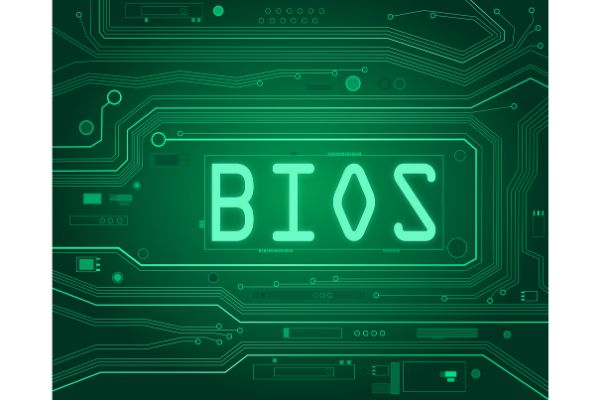Disclaimer: This post may contain affiliate links, meaning we get a small commission if you make a purchase through our links, at no cost to you. For more information, please visit our Disclaimer Page.
You rely on your computer for playing games and checking email as well as doing work for school or your job. There are few things worse than turning it on and finding that it freezes. While you can restart your computer, there’s no guarantee that this will fix the problem. A common time for a computer to freeze is at BIOS (Basic Input/Output System).
BIOS is a type of firmware that handles the needs of your operating system. If you do a cold boot and turn on your computer via the power/start button, it will enter BIOS.
This allows the system to check on all of your components and accessories to ensure they work properly, including your keyboard and mouse. We’ll go over why your computer freezes and BIOS and what you can do.
Table of Contents
Can BIOS Cause Computer Freeze?
BIOS can cause your computer to freeze. This can occur because you modified or changed any of your system’s settings or you have a serious issue with your operating system. Using an unregisterd or unlicensed version of Windows can cause this issue too.
3 Types of Computer Freezes
There are different types of freezes that can affect your computer. One is a hang freeze, which will require that you shut down your computer and restart it. A random hang occurs when your system no longer responds and can happen multiple times.
During a generic freeze, your computer freezes for an unknown reason but does not require a lot of time or steps to fix. In many cases, your system will work itself out and begin responding again.
There is also a single app freeze. This relates to a specific app and may require that you delete it from your computer. Any of these freezes can cause you to lose valuable or important data.
There could also be other reasons your computer freezes. Stellarinfo has a great article about the 10 reasons your computer freezes.
If you find that find that your computer does crash shortly after, check out an article we have written here about it.
Why Does My Computer Freeze at BIOS?
If you do a simple Google search for why does my computer freeze at BIOS?, you’ll find that this is a common problem that many people experience. It can occur every time you turn on your computer or a few times a month.
It often happens when you update your system. Did you recently upgrade to a newer version of Windows and found that your computer keeps freezing when you try to use it? You may even find that you need to restart the system several times before you finally see your desktop.
Another reason your computer freezes is that you modified the BIOS settings. Many people online say that anyone can modify their settings, but we only recommend this if you have computer experience.
We’ll go over how you can reset the BIOS settings in another section to keep your system from freezing. Some of the other reasons your computer freezes at BIOS can include:
- You made recent changes to your CMOS
- A program you downloaded made changes to your BIOS settings without your permission.
- You used a device with a USB cord without properly installing it or using the right driver.
- The computer suffered a corruption that affects your sound card or other components.
- You enabled fast start and caused your computer to try to skip BIOS.
- The computer has a defective HDD.
How to Stop My Computer Freeze at BIOS
To keep your computer from freezing at BIOS, you may need to reinstall everything. Start with your power cables and peripherals before moving on to your internal data. You then need to reinstall your expandable cards and memory modules.
Make sure that you unplug both your mouse and keyboard and uninstall any drivers they use. You can always reinstall them later. Once you remove everything, restart your computer.
Head into your Control Panel and begin installing the apps and drivers that you used before. It’s important that you reinstall them one at a time. After the download finishes, restart your computer and see if the problem persists. Unfortunately, we found that this doesn’t always offer the solution that you need, though.
You may have an issue that requires more work on your part. That is why we wanted to look at some of the other ways you can get your computer to stop freezing at BIOS.
Check the HDD
If your computer freezes at BIOS, try checking your HDD (hard disk drives). Any loose cables can keep the system from identifying and using your HDD. Simply using a firm touch to push the HDD back in place and using the right SATA cable can help.
You may want to remove the HDD and look for defects on another system. If a different computer cannot recognize your HDD, you found the root of your problem and will need to replace it.
MBR Issues
The MBR (master boot record) on your computer forces your computer to recognize and use Microsoft Windows when you turn on your system. A defective MBR or one that is corrupted will no longer work the way it should.
When you turn on your computer, it cannot run Windows and may freeze during BIOS. The only way to get your computer unfrozen and working again is to replace the MBR.
Non-working RAM
Similar problems occur because of issues with your RAM (random-access memory). RAM sticks give you extra storage and room for programs and games or other files. Many systems today have a minimum of two RAM sticks. Use your settings to check the RAM.
You may find that only one of the two sticks is working. Removing and replacing one of the sticks is a possible remedy.
If you find that the RAM sticks work but you still have problems with your computer freezing, there’s a good chance that you have a motherboard or a motherboard slot that no longer works.
How to Reset Your BIOS Settings
As we said above, you should not change your computer settings unless you have some experience. If all else fails, resetting your BIOS settings might be the best way to unfreeze your computer and keep it from freezing.
To modify your settings, turn your computer off and restart it. During the Power-On Self-Test (POST), hit the F1 key.
You should check with your computer’s brand though, as some brands require that you press F2 or F10. Some computers even require that you use the ESC or DEL key to enter the BIOS menu.
Look for the “Load Setup Defaults,” which your computer may call “Rest” or “Load Optimized Defaults.” You will need to use your arrow keys to select this option. This will bring up a window that asks if you’re sure you want to restore a previous version of your settings. Hit the “Y” or “Enter” key to agree.
Once you save the new settings, the computer will restart and run Windows. You can try this method before or after trying some of the other remedies we found.
If the issues persists, have a professional take a look at it. There could be other problems causing your computer to freeze at BIOS.
What to do if My Computer Freezes During BIOS Update?
Most computers will ask for your permission to update. If you keep saying no, though, the system may require that you update at some point. This can lead to your computer freezing in the middle of an update.
Even if your computer tries to restart later, it will keep freezing when it reaches BIOS. This may occur because the update bricked your motherboard, which will require that you replace it or your entire computer. Before you worry about spending money, try restarting your computer. This may give the system a chance to reinstall the update.
If you have an ASUS computer, see if it came with a USB. ASUS includes a USB with many of its top models that have a version of the original operating system on it. Turn your computer off and switch off the motherboard.
You also need to unplug the computer and clear your CMOS. Insert the USB into one of your open ports and restart the computer.
Though it can take up to 10 or 20 minutes to work, you can run the system via the USB. Go into your BIOS settings as described above and rename your BIOS file. You can then remove the USB and turn on the motherboard before switching on your computer.
How to Prevent Other Freezes
Besides BIOS issues, your computer may freeze for other reasons. Make sure that you don’t have an unregisterd or unlicensed version of Windows or open too many files at the same time.
An easy way to see if your computer has enough free space is when you load your Task Manager. Press the “CTRL” button at the same time that you hold down the “ALT” and “DLT” buttons to bring it up.
You can then see how much space your open programs use and close any that uses too much space.
You should also update any programs that you use often and look for driver updates. Whether you use a video game controller with your PC or an external mouse with your laptop, you need to keep the drivers updated.
Microsoft has tools that allow you to check your operating system and download updates as soon as they become available.
While it can take hours for Windows to update to a new version, it will save you hassles later.
Don’t forget to scan your computer every week. Antivirus software helps you find malware such as spyware and adware that can make your system run slowly and cause it to freeze or crash.
Keep Your Computer from Freezing at BIOS
Stop your computer from freezing at BIOS with a look at what causes this problem, including motherboard issues and changes to your settings. Use any of the methods we found to get your computer working again whenever it freezes.


